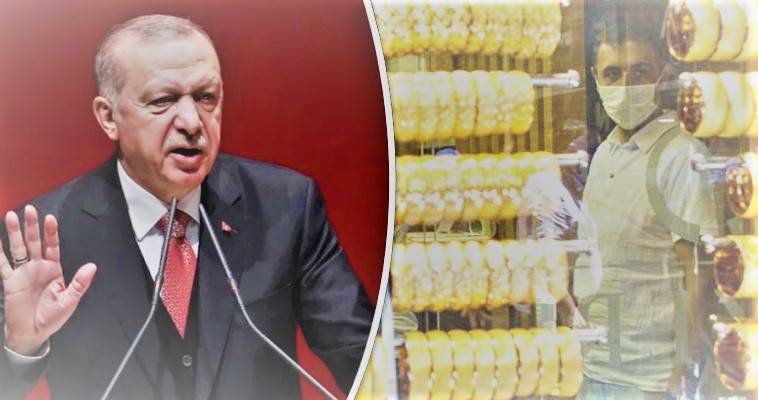George Iliopoulos: The hunt for gold in Turkey
16/01/2021
Always in times of uncertainty people around the world seek the security of gold to protect themselves from dangerous and unstable fluctuations in values and other more sensitive assets. In the current and extremely fluid period in no other country does the anxious search for gold emerge to such an extent as in Turkey, a country with a long post-war history of great and painful economic crises.
These experiences have eroded confidence in the country’s political and economic institutions, with the main feature being the abysmal gap between citizens’ daily experiences and official economic data released by the government.
At the end of 2020, Aykan Erdemir and John Lechner assembled on behalf of “National Interest” the views and estimates of reputable economic analysts, driven by the frightening increase in gold demand in Turkey, which reveals another invisible economic reality evolving internally. The general impression is that the Turkish economy is moving “like a catastrophic slow-moving rail accident”, says a former central banker who prefers to remain anonymous.
The rapid depreciation of the Turkish lira against the US dollar and the European common currency highlights the Turkish currency, along with the South African yen, as the worst-performing national currencies in 2020. Failed support efforts have cost billions of dollars resulting in net foreign exchange reserves set at negative levels, at 50 billion.
The hunt for gold
To cover it, the Central Bank utilizes double foreign exchange debt contracts (FX Swaps), ie it borrows foreign exchange reserves from private banks with the first contract and delivers them to public banks, with a parallel return in Turkish lira on the second contract. these banks then sell the currency to slow down the collapse of the currency.
According to analysts, the best way to document the evolving economic crisis in Turkey is to focus on the frantic search for gold by individuals and legal entities. During 2020, investments in gold will triple to $ 36 billion, in addition to the 3,000 to 5,000 metric tons of the precious metal valued at $ 186 billion to $ 310 billion at current market prices estimated by citizens.
The pressure to increase gold imports to meet the meteoric rise in demand is wreaking havoc on the trade deficit, which widened by $ 45 billion in 2020, almost double that of the previous 12 months of 2019. With the population having vast and valuable experiences in phenomena of hyperinflation, sharp devaluations, and bank bankruptcies that have destroyed property literally in one day, Turkish citizens have acquired an almost metaphysical sense of danger.
This element satisfactorily explains the sudden turn of the public towards gold and offers the possibility of formulating an informal index, which tracks the degree of pressure exerted on the financial system. In fact, it provides greater accuracy than the usual macroeconomic indicators, which are typically used to predict the trajectory of an economic system, but without time indications.
The fear of a bank run
For the average Turkish citizen, gold is the safest form of savings and literally it’s an impregnable fortress in times of systemic crisis. A recent large survey by the Turkish subsidiary of the Dutch banking group ING in Turkey shows that one in four citizens in the country holds gold and hard currency. In fact, during the summer period of 2020, the sales of safes quadrupled on a monthly basis, reaching 4,000.
In addition to those who have formed gold and hard currency reserves who keep them in a place outside banks, a percentage of 18% have bank accounts in gold. But the preference for holding gold in private, rather than banks, despite attractive interest rates, at least reveals that Turks believe $ 258 billion in gold and hard currency deposits are no longer safe.
There is widespread fear of bank runs, as well as strong concern that their deposits, especially in hard currency, are in danger of being frozen suddenly, at which point they will lose the only other safe haven, except from gold, against the sharp devaluation of the lira. A key element associated with the anxious search for gold, derives from the destruction of average per capita income, which fell sharply to $ 7,800 in 2020, a performance comparable to the 1998 equivalent of $ 8,293 (while the former has not been deflated), so it is even lower in real terms, with the corresponding size of 2019 reaching $ 15,000.
The leaps and bounds of the price index
Another issue that exacerbates fears of a financial crisis stems from the 2020 price index jump. A study was conducted by Medipol University in Istanbul with basic data on the collection of evidence of the purchase of basic foodstuffs, starting in October and ending in December 2020. The markets consistently consist of ten items, such as eggs, cheese, olive oil, pasta, milk and found that in less than a quarter, the increase in prices as a whole, approaches 33%, from 85.55 to 113.60 Turkish pounds.
However, the official announcements from the Turkish Statistical Institute place the inflation of December at 14.6% and the increase of the index at 20.6%. The survey also found that eight million workers were paid the minimum wage, while there are 13 million retirees and seven million unemployed at the same time.
The Central Bank has more than doubled its interest rates from 8.25% in September to 17% in December and is pushing for a new increase in its regular meeting on January 21, 2021.
But the currency crisis is not receding and Turkish citizens continue to buy hard currency with sales of Turkish lira for security reasons. At the same time, deposit rates in the national currency do not cover the indexation increase, while according to the ENAGrup center (ENAG), real inflation in December reached 36.7%.
This center was established in 2019 by Turkish academics, with the main purpose of monitoring inflation and the fundamental economic figures of the country. According to the poll company METROPOL and its latest survey (December 2020), 51% of respondents estimate that the annual price increase exceeded 30%, apparently following the real inflation.





